How to Conduct a Soft Skills Interview in 4 Easy Steps
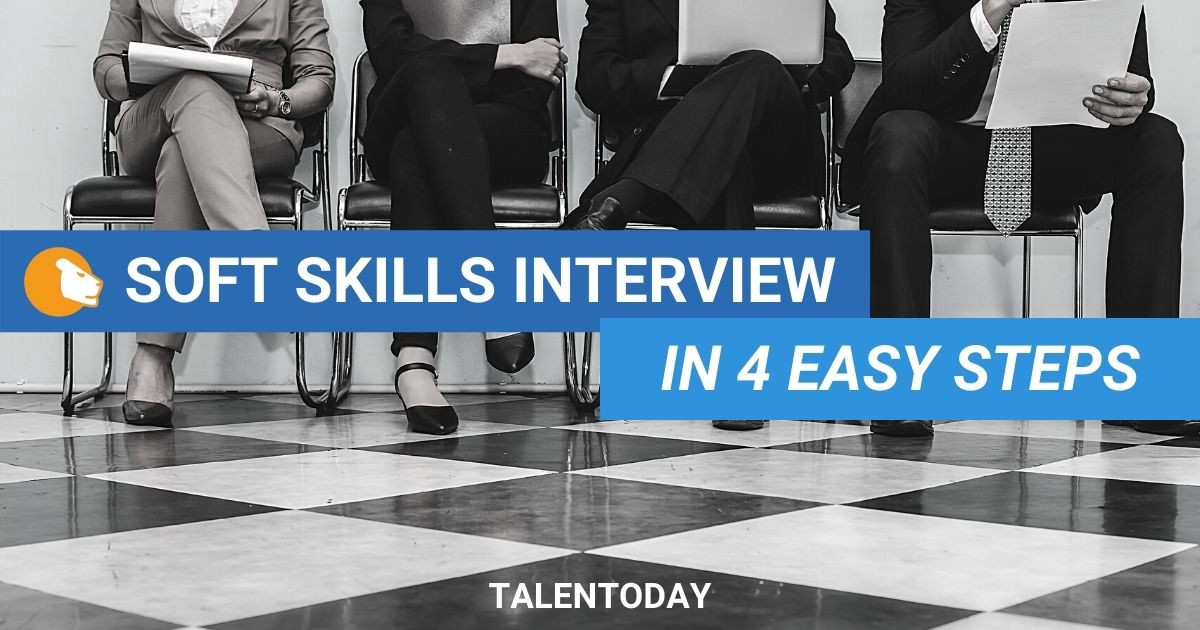
If you have been following our blog then you know how important we think soft skills are to incorporate into your daily work lives.
“Hard skills will get you the job, but soft skills will make you successful.” -Me, at least 3 times per week
However, sometimes this can seem overwhelming. Where should you, as a manager, start? In this blog article we will take a step-by-step look at how to use soft skills from the very beginning of the employee lifecycle: the interview process.
Step 1: The Job Requirements
At first glance, you might think you know what goes into a position. Maybe you have been hiring for this position for quite some time, or you have worked with individuals in this role before. Although you might think you know all of the important requirements for a role, it is still important to take the proper steps to evaluate a job description in order to make a more informed decision on what the role entails.
Once you have determined what hard skills and qualifications are necessary for a position, it is time to determine what soft skills will help someone be successful in this role. There are many ways to find this information. Here are a few of the common ones:
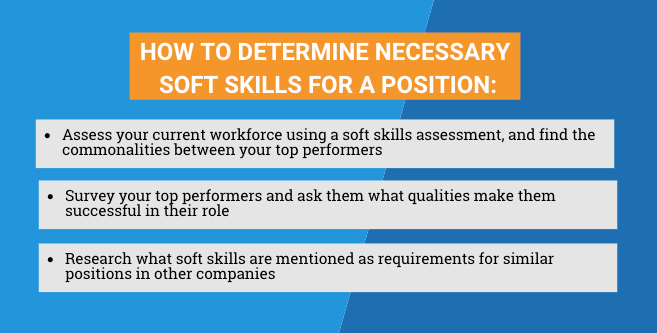
It is very important that you are using a scientifically reliable and valid method to assess your teams’ soft skills. For the purpose of this article, we recommend using the MyPrint® assessment to assess your current workforce and using some of our tools available through Talentobe Manager to determine what to look for during the interview process.
An important note here: although you are looking for commonalities among your top performers, that does not mean that you want a cookie cutter of those individuals. One of the most important things for a team’s success is having diversity among group members to help fill in skills gaps and increase creativity and innovation¹.
Step 2: Preparation
Now that you have determined what the important soft skills are for the position, you need to prepare for the interview. Having a set interview process helps to ensure that you are making more informed decisions for your company and not using personal judgments or unconscious biases when hiring. Topgrading² is one example of an interview methodology that is intended to help identify top talent, and incorporating soft skills into this methodology is seamless.
Prior to the interview starting, you will also want your candidates to complete a MyPrint® assessment (check that their results are from the past 6 months to ensure accuracy). Make sure that the hiring manager and anyone involved in the interview process have taken the time to review the candidate’s MyPrint® One Pager (soft skills summary) and are familiar with the soft skills that have been determined important for the role.
To prepare for the soft skills portion of the interview, we recommend that you have the Premium Report version of the candidate’s results handy and review their top 3 personality strengths, motivators, and behaviors (as shown on the One Pager report). Then ask yourself the following questions:
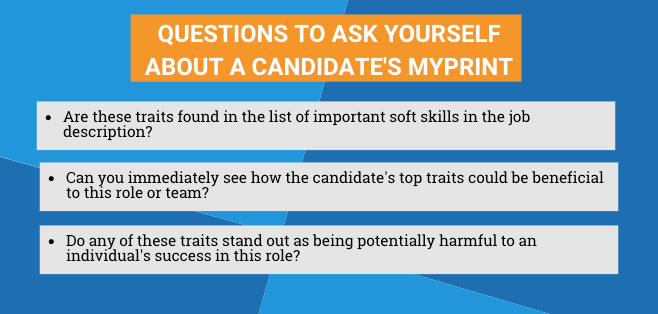
Lastly, take a look at the candidate’s behaviors. The MyPrint® Premium Report has two interview questions tailored to each behavioral style to help gain a better understanding of how that individual showcases those styles. Make a note of any behaviors that you would like to dig deeper on, and have those interview questions ready to go!
Step 3: Conducting the Interview
When conducting a soft skills interview, it is important to stay open minded. If someone’s top three MyPrint® traits aren’t the exact three that you are looking for that does not mean they are not going to be a good candidate. Instead, look at their Premium Report to see where they fall on the scale for each of those traits. Take the time to ask questions around those topics, and make sure that you are being clear about the role expectations and see if that matches what they are looking for.
Step 4: Scoring the Interview
Once the interview is completed and the candidate has left, it is not time to make a decision quite yet! Take the time to review your interview notes and apply some quantitative metrics to what you were looking at.
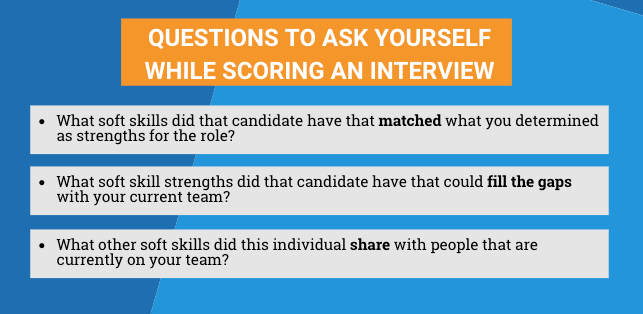
To ensure fairness between candidates, use a standardized method of scoring the interviews. Grading methods can include ranking responses or finding the difference between ideal scores and actual scores in their MyPrint® scales.
To Sum It All Up…
Using soft skills in the interview process can help you make more informed hiring decisions, and help you find candidates who will be more successful in their role. The interview process is an investment for everyone involved, so it is not something that should be done without careful evaluation and purpose.
Remember to be open-minded when it comes to soft skills; you won’t have all of the answers right away. As you gather more information over time you will learn more about what personality traits, motivations, and behavioral styles can be attributed to success in a role and sometimes, what you find might surprise you!
Want more information about soft skill interviewing, or to receive a copy of our template? Email Talentobe at customer@talentobe.com to learn more about our assessment and services!
Sources
¹https://www.managers.org.uk/knowledge-and-insights/listicle/the-five-business-benefits-of-a-diverse-team/
²https://topgrading.com/
Do you Really Know Who You’re Interviewing?

A job interview can go anywhere from 15 minutes, if it’s not going well, to about an hour, if it’s going great! But is this polished, poised, prepared-to-impress you candidate the same person you’d see on a day-to-day basis? Interviewing is an art, and the decision to hire often is dependent on the interviewer’s instinct. “Unfortunately most research shows that you can only trust your gut when it comes to hiring about 50 percent of the time,” says Beverly D. Flaxington, author of Understanding Other People: The Five Secrets to Human Behavior in this ZipRecruiter article. “And a bad hire is costly and disruptive.”
There are ways to increase the odds that your instinct about a candidate is right and avoid costly bad hires. One way is to use a screening company like HireArt — they conduct the first round of video interviews over Skype for you. Another is to partner with a candidate matching service liked Hired.com, where your job openings get matched with resumes in their database. While that’s a very handy tool for matching skill and experience, it’s still only part of what will make an employee last long term. To truly understand whom you’re interviewing you need to introduce objective, personality assessment data into your evaluation. By giving candidates a 15-minute quiz using Talentobe, you’ll have:
- Unique insights you won’t get in an interview. The results will give you a clear understanding of what motivates and drives your candidate, as well as show you their predictive behaviors in seven key areas: teamwork, ability to take initiative, management style, ability to handle pressure, reasoning style, communication style, and flexibility. You’ll see how well a candidate works under pressure, and even what areas in which a candidate could improve.
- Candidate vs. Candidate comparisons. You’ll be able to see how your prospective hire ranks in personality, motivations and soft skills compared to others in your industry. There could be similarities and differences that will help you identify the kind of person you’re looking for.
- Candidate vs. Company comparison. Since Talentobe urges you to assess your team to get a sense of what you are looking for, it will be easy to see how or if your potential hire aligns. You can also widen the scope and see how the candidate fits within the culture of the whole company.
Here’s an example of Jennie, a real candidate who took the Talentobe assessment.
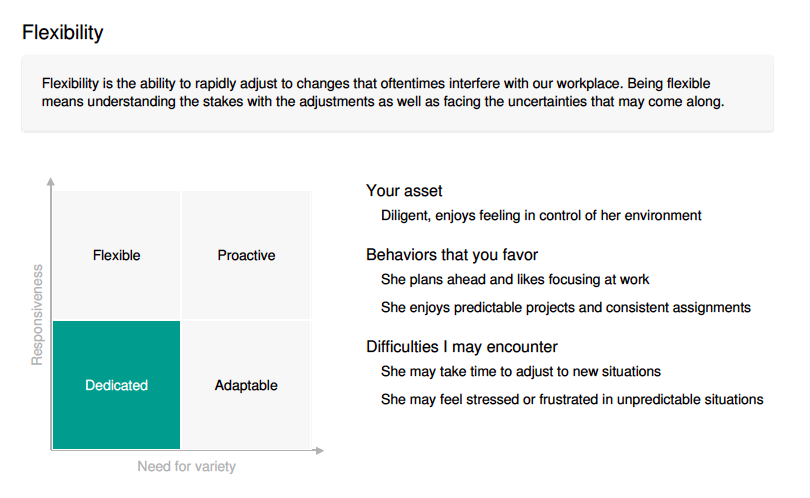
You can see that Jennie is a dedicated planner and thrives with a predictable structure. If the position you’re hiring doesn’t match that kind of environment, it won’t matter if her experience and hard skill set is a match, she probably won’t be a happy, long-term employee.
With the insight and intelligence that Talentobe provides added to your interview process, you’ll be confident that you’re choosing the right employee for your team.
Want valuable insights on your top recruits ? Start your free trial today and use predictive analytics and psychology to make smart hiring decisions. And if you like this post, please hit the ❤️ button below or give me a shout on Twitter.